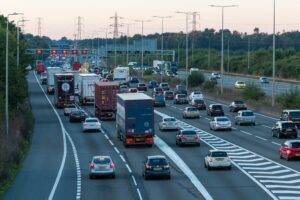
Delaying a ban on sales of new petrol and diesel cars could put drivers off switching to electric, the boss of the UK’s motoring industry body has warned.
Ministers are understood to be considering pushing back a planned ban from 2030 to 2035.
Mike Hawes, of the Society of Motor Manufactures and Traders, said the “message” it would send to consumers would be “incredibly confusing”.
Since 2020, the government’s policy has been to ban the sale of new, pure petrol and diesel vehicles by 2030 as part of a broader plan to reach net zero.
However, multiple sources have said that Prime Minister Rishi Sunak is considering weakening the plan, along with several other green commitments, to save money.
In response to the potential delay, Ford, one of the UK’s most popular car brands, selling more than 126,000 vehicles in 2022, said the change would “undermine” its plans.
Lisa Brankin, Ford UK chair, said the 2030 target “is a vital catalyst to accelerate Ford into a cleaner future”, adding the company had already invested £430m in readying its UK plants to produce electric cars.”Our business needs three things from the UK government, ambition, commitment, and consistency. A relaxation of 2030 would undermine all three,” she added.
Stellantis, which owns Vauxhall, Peugeot, Citroen and Fiat, said it was “committed to achieve 100% zero emission new car and van sales in the UK and Europe by 2030”, regardless of any potential delay to the ban.
But it added: “Clarity is required from governments on important legislation, especially environmental issues that impact society as a whole.”
Anna Valero, an economist on Chancellor Jeremy Hunt’s advisory committee, said a delay would be “bad for the UK” and “yet another example of policy volatility that prevents businesses taking the long-term investment decisions needed for a stronger, more resilient and sustainable economy”.
Most consumers will not be impacted by the ban immediately, as the majority tend to buy vehicles second hand.
However, Mr Hawes, the SMMT’s chief executive, said that news of a delay was “a bit of concern” for carmakers.
“The concern now is, does this cause consumers to delay their purchase [of an electric car]?,” he added.
“We are questioning what is the strategy here because we need to shift the mobility of road transport away from fossil fuels towards sustainable transport and we don’t know quite what is going to happen now,” he added.
“We should be at the forefront of this change. After all, ending emissions from road transport is the only way that you will achieve net zero.”
Edmund King, president of the AA motoring group, said the 2030 goal was “ambitious but achievable”, but added what the car industry and drivers wanted was “more certainty so they can plan for the future”.
The SMMT said the UK car industry has been very successful in recent months in securing investment to develop zero-emission cars.
Earlier this month, German car giant BMW announced plans to invest hundreds of millions of pounds to prepare its Mini factory in Oxford to build a new generation of electric cars, while Jaguar Land Rover-owner Tata confirmed plans in July to build a £4bn battery plant in Somerset.
The projects have been backed by government subsidies.
BMW sources said pushing back the ban to 2035 would not change its plans and rubbished reports suggesting the government had promised to keep the 2030 target as a condition for its recent investment.
Jaguar Land Rover said its net zero plans were “on track” and said it would “welcome certainty around legislation for the end of sale of petrol and diesel powered cars”
Separately, Mr Hawes said he was “assured” that the zero emission vehicles mandate, a requirement that 22% of cars sold by each manufacturer are zero emission from 2024, would still be introduced.
Read more:
Warning petrol ban delay could stop people buying electric cars






